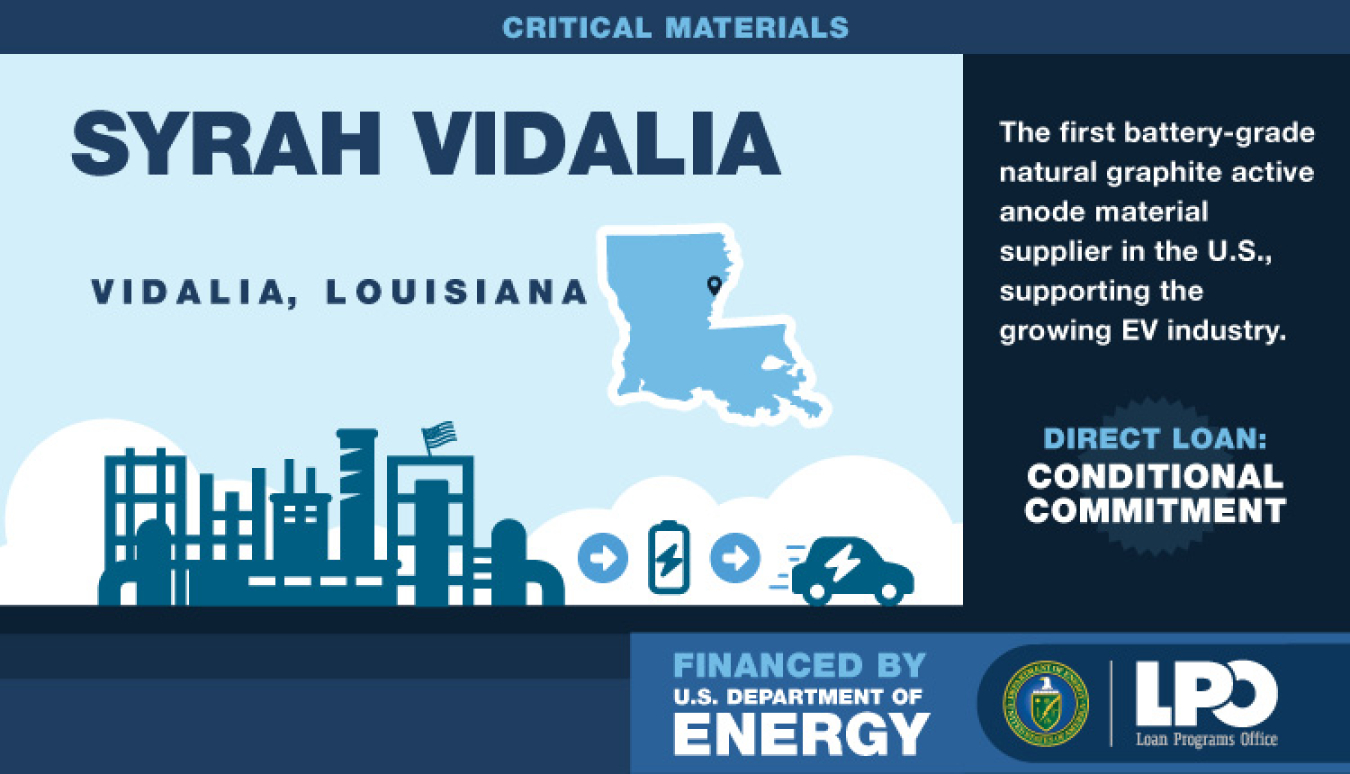
There will be many exciting milestones as the United States transitions to electric vehicles (EVs), and today marks the latest one. The Department of Energy’s Loan Programs Office (LPO) has offered a conditional commitment to lend up to $107 million to Syrah Technologies, LLC to expand its capacity to produce critical materials for lithium-ion batteries at the Syrah Vidalia Facility in Vidalia, Louisiana. With this newly expanded production capacity, the Syrah Vidalia Facility is expected to produce enough natural graphite-based active anode material (AAM) for approximately 2.5 million EVs by 2040, thus saving an estimated 970 million gallons of gasoline. Syrah Vidalia will also help grow Louisiana’s auto manufacturing industry by creating approximately 150 construction jobs and 98 good-paying, highly skilled operations jobs within the clean energy sector. LPO works with all borrowers to create good-paying jobs with strong labor standards during construction, operations, and throughout the life of the loan and to adhere to a strong Community Benefits Plan.
If finalized, this would be the first loan from LPO’s Advanced Technology Vehicles Manufacturing (ATVM) program in more than a decade. And after providing loans to auto manufacturers like Ford, Nissan, and Tesla, this would be the first-ever ATVM loan to support a supply chain manufacturing project. It further demonstrates the Department’s commitment to building a strong domestic supply chain for zero emission transportation solutions like EVs and the Biden Administration’s commitment to strengthen America’s critical mineral supply chains and grow the U.S. workforce to support domestic battery manufacturing for EVs. It also supports the Department’s first-ever comprehensive strategy to secure America’s clean energy supply chain. One key area of focus within this strategy is to increase the availability of the critical minerals and related materials that are key components to the clean energy technologies we need to achieve our national climate and economic goals. This announcement builds on a recent authorization by President Biden to use the Defense Production Act to secure sustainable and reliable domestic sources of critical materials for large-capacity batteries, including graphite.
Graphite is a crucial component for lithium-ion batteries that are used in hybrid and electric vehicles, as well as consumer devices like cellphones, and laptop computers. In fact, lithium-ion batteries require more graphite than any other battery material by mass, including lithium. However, today the United States is 100% reliant on imported graphite as China produces nearly all of the high-purity graphite needed to make lithium-ion batteries. It’s vital that the United States secures a consistent supply of critical minerals, like graphite, to reduce vulnerabilities from adverse foreign government actions, natural disasters, and other avoidable supply disruptions. Natural graphite for the Syrah Vidalia Facility will come from the mining and processing operation in Balama, Mozambique, which is also owned and controlled by Syrah Technologies’ parent-owner, making the Syrah Vidalia Facility the only vertically integrated, large-scale AAM producer outside of China, and the first such supplier in the United States.
This secure, responsible domestic supply chain expansion couldn’t come at a more important time. Meanwhile, U.S. auto manufacturers are already seeking opportunities to secure domestic supplies of critical minerals like graphite; Syrah has executed a four-year offtake agreement with Tesla to sell the majority of AAM produced from the Syrah Vidalia Facility. The remaining capacity is expected to be sold to other auto and EV battery manufacturers.
Importantly, this project also provides a socially and environmentally responsible U.S. supply chain for graphite.
- Syrah is committed to aligning with leading Environmental, Social, and Governance (ESG) frameworks, exercising best practices in sustainable mining established by organizations including the Initiative for Responsible Mining Assurance, the Global Reporting Initiative, the United Nations Sustainable Development Goals, and the International Council in Mining and Metals Mining Principles.
- The company maintains a strong safety record, maintaining ISO:45001 Occupational Health & Safety and ISO:14001 Environmental Management Systems certifications certification at its mining and process operation in Balama, Mozambique, and a ISO:9001 Quality Management System certification at the Syrah Vidalia Facility. Last year, Syrah was awarded first place from the Mozambican General Labor Inspection for “Good Practices in Safety and Health at Work” among large mining companies.
- Syrah focuses heavily on recruiting local employees at both its Balama mining and processing operation (where 96% of employees are Mozambican and 18% are female) and the Syrah Vidalia Facility (where 19% of employees are female), and has a public Diversity and Inclusion Policy with measurable objectives to drive gender diversity in its workforce. It is also partnering with Mozambique Institute of Vocational Training & Labour Studies to operate the Balama Training Centre to improve the employability of members of its Mozambican host communities by training them in work readiness, health and safety, and equipping them with range of technical skills in electrical and mechanical industries.
- For accountability, Syrah issues a quarterly sustainability report that directly addresses health and safety, environment, community and stakeholders, and people, and highlights Syrah’s alignment to internationally adopted ESG frameworks.
Projects like Syrah Vidalia are critical to our national security, our foreign policy, building our supply chain, and our economy. While this conditional commitment demonstrates the Department’s intent to finance the project, several steps remain, and certain conditions must be satisfied before the Department issues a final loan. Stay tuned as LPO picks up momentum in our efforts to finance transformative U.S. energy infrastructure.

